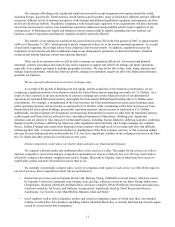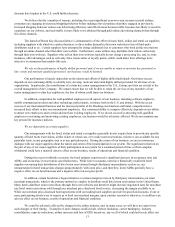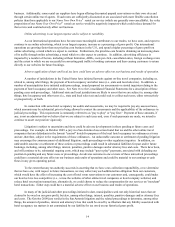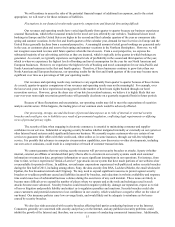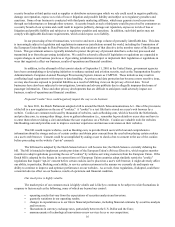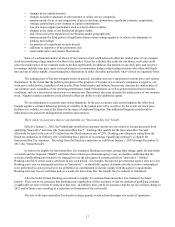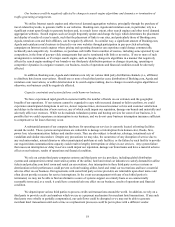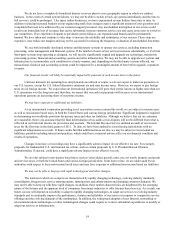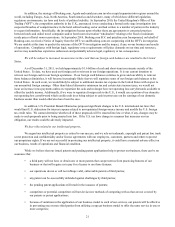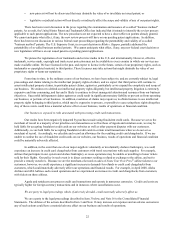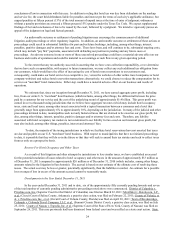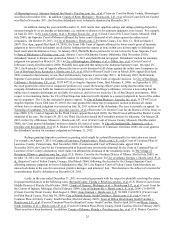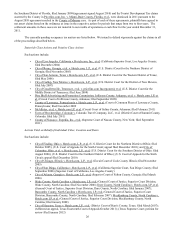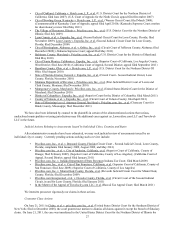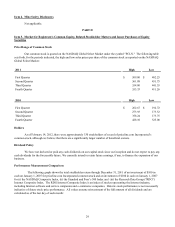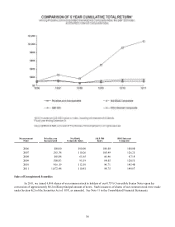Priceline 2011 Annual Report Download - page 22
Download and view the complete annual report
Please find page 22 of the 2011 Priceline annual report below. You can navigate through the pages in the report by either clicking on the pages listed below, or by using the keyword search tool below to find specific information within the annual report.21
In addition, the strategy of Booking.com, Agoda and rentalcars.com involves rapid expansion into regions around the
world, including Europe, Asia, North America, South America and elsewhere, many of which have different legislation,
regulatory environments, tax laws and levels of political stability. In September 2010, the United Kingdom's Office of Fair
Trading ("OFT"), the competition authority in the U.K., announced it was conducting a formal early stage investigation into
suspected breaches of competition law in the hotel online booking sector and had written to a number of parties in the industry
to request information. Specifically, the investigation focuses upon whether there are agreements or concerted practices
between hotels and online travel companies and/or hotel room reservation "wholesalers" relating to the fixed or minimum
resale prices of hotel room reservations. In September 2010, Booking.com B.V. and priceline.com Incorporated, on behalf of
Booking.com, received a Notice of Inquiry from the OFT; we and Booking.com are cooperating with the OFT's investigation.
We are unable at this time to predict the outcome of the OFT's investigation and the impact, if any, on our business and results
of operations. Compliance with foreign legal, regulatory or tax requirements will place demands on our time and resources,
and we may nonetheless experience unforeseen and potentially adverse legal, regulatory or tax consequences.
We will be subject to increased income taxes in the event that our foreign cash balances are remitted to the United
States.
As of December 31, 2011, we held approximately $1.6 billion of cash and short-term investments outside of the
United States. To date, we have used our foreign cash to reinvest in our foreign operations. It is our current intention to
reinvest our foreign cash in our foreign operations. If our foreign cash balances continue to grow and our ability to reinvest
those balances diminishes, it will become increasingly likely that we will repatriate some of our foreign cash balances to the
United States. In such event, we would likely be subject to additional income tax expense in the United States with respect to
our unremitted foreign earnings. Other than federal alternative minimum tax and certain state income taxes, we would not
incur an increase in tax payments unless we repatriate the cash and no longer have net operating loss carryforwards available to
offset the taxable income. Additionally, if we were to repatriate foreign cash to the U.S., it would use a portion of our domestic
net operating loss carryforward which could result in us being subject to cash income taxes on the earnings of our domestic
business sooner than would otherwise have been the case.
In addition, U.S. President Barack Obama has proposed significant changes to the U.S. international tax laws that
would limit U.S. deductions for interest expense related to un-repatriated foreign-source income and modify the U.S. foreign
tax credit rules. We cannot determine whether all of these proposals will be enacted into law or what, if any, changes may be
made to such proposals prior to being enacted into law. If the U.S. tax laws change in a manner that increases our tax
obligation, our results could be adversely impacted.
We face risks related to our intellectual property.
We regard our intellectual property as critical to our success, and we rely on trademark, copyright and patent law, trade
secret protection and confidentiality and/or license agreements with our employees, customers, partners and others to protect
our proprietary rights. If we are not successful in protecting our intellectual property, it could have a material adverse effect on
our business, results of operations and financial condition.
While we believe that our issued patents and pending patent applications help to protect our business, there can be no
assurance that:
• a third party will not have or obtain one or more patents that can prevent us from practicing features of our
business or that will require us to pay for a license to use those features;
• our operations do not or will not infringe valid, enforceable patents of third parties;
• any patent can be successfully defended against challenges by third parties;
• the pending patent applications will result in the issuance of patents;
• competitors or potential competitors will not devise new methods of competing with us that are not covered by
our patents or patent applications;
• because of variations in the application of our business model to each of our services, our patents will be effective
in preventing one or more third parties from utilizing a copycat business model to offer the same service in one or
more categories;


